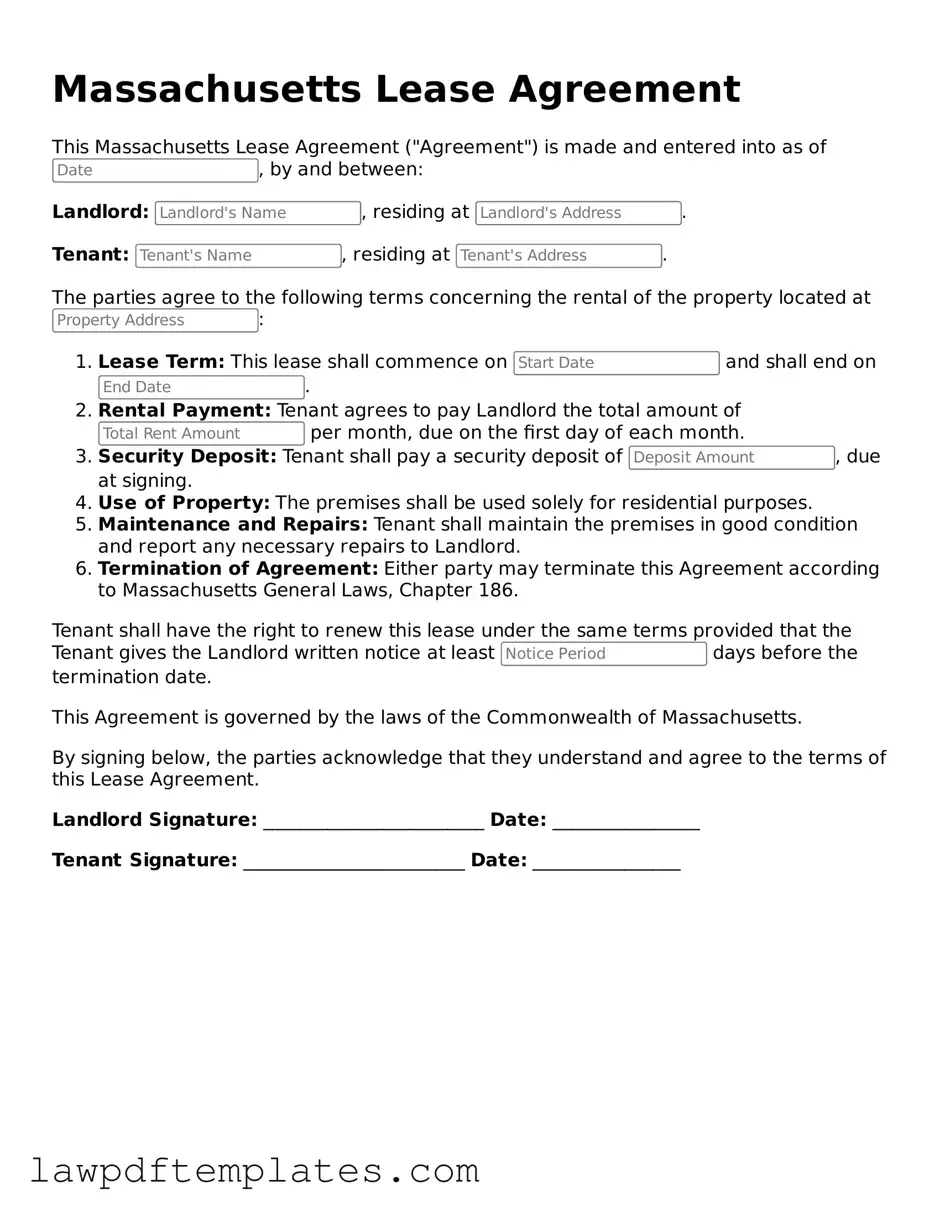Free Lease Agreement Template for the State of Massachusetts
Form Breakdown
| Fact Name | Description |
|---|---|
| Governing Law | The Massachusetts Lease Agreement is governed by Massachusetts General Laws, Chapter 186, which outlines the rights and responsibilities of landlords and tenants. |
| Required Information | The lease must include essential details such as the names of the parties involved, the rental property's address, the duration of the lease, and the amount of rent. |
| Security Deposit Regulations | In Massachusetts, landlords can collect a security deposit, but it cannot exceed one month's rent. The deposit must be held in a separate account and returned to the tenant within 30 days after the lease ends. |
| Notice Requirements | Landlords must provide tenants with written notice of any lease violations and allow them a reasonable opportunity to correct the issue before taking further action. |
Sample - Massachusetts Lease Agreement Form
Massachusetts Lease Agreement
This Massachusetts Lease Agreement ("Agreement") is made and entered into as of , by and between:
Landlord: , residing at .
Tenant: , residing at .
The parties agree to the following terms concerning the rental of the property located at :
- Lease Term: This lease shall commence on and shall end on .
- Rental Payment: Tenant agrees to pay Landlord the total amount of per month, due on the first day of each month.
- Security Deposit: Tenant shall pay a security deposit of , due at signing.
- Use of Property: The premises shall be used solely for residential purposes.
- Maintenance and Repairs: Tenant shall maintain the premises in good condition and report any necessary repairs to Landlord.
- Termination of Agreement: Either party may terminate this Agreement according to Massachusetts General Laws, Chapter 186.
Tenant shall have the right to renew this lease under the same terms provided that the Tenant gives the Landlord written notice at least days before the termination date.
This Agreement is governed by the laws of the Commonwealth of Massachusetts.
By signing below, the parties acknowledge that they understand and agree to the terms of this Lease Agreement.
Landlord Signature: ________________________ Date: ________________
Tenant Signature: ________________________ Date: ________________
Common mistakes
Filling out a Massachusetts Lease Agreement form can seem straightforward, but many individuals overlook critical details that can lead to complications down the road. One common mistake is failing to include all necessary parties involved in the lease. Both the landlord and tenant must be clearly identified. Omitting a co-tenant or subtenant can create confusion and potential legal issues later.
Another frequent error is neglecting to specify the lease term. It's essential to indicate whether the lease is for a fixed term, such as one year, or if it is a month-to-month arrangement. Without this clarity, misunderstandings about the duration of the lease can arise, leading to disputes over termination and renewal.
People often forget to detail the rental amount and payment terms. The lease should clearly state the monthly rent, when it is due, and acceptable payment methods. Leaving out these details can result in late payments or disagreements about what is owed.
Additionally, some individuals do not include information about security deposits. In Massachusetts, landlords are required to provide specific information regarding the handling of security deposits, including the amount and the conditions for its return. Failing to address this can lead to disputes when a tenant moves out.
Another mistake is overlooking maintenance responsibilities. The lease should outline who is responsible for repairs and maintenance. If this is not clearly defined, it may lead to conflicts about who is accountable for fixing issues that arise during the tenancy.
Some landlords and tenants also forget to include policies on pets. If a property has restrictions on pet ownership, these rules should be explicitly stated in the lease. Without this information, tenants may assume they can have pets, leading to potential eviction or additional fees.
Moreover, individuals often neglect to mention the consequences of lease violations. The lease should clearly outline what happens if either party fails to adhere to the agreement. This includes late fees, eviction processes, and other penalties. Clarity in this area can prevent disputes and misunderstandings.
Another oversight is the lack of a clear process for resolving disputes. Including a clause that outlines how conflicts will be handled—whether through mediation, arbitration, or litigation—can save both parties time and stress in the event of disagreements.
Finally, many people fail to read the lease thoroughly before signing. It is crucial to review the entire document to ensure all terms are understood and agreed upon. Rushing through this process can lead to unintended commitments or overlooked clauses that may have significant implications for both parties.
Discover More Lease Agreement Templates for Specific States
How Do I Print a Rental Agreement - Specifies remedies available to the landlord for lease violations.
Free Lease Print Out - It functions as a legal document that can support claims in court if necessary.
Free Rental Agreement California - Establishes the governing laws for the lease agreement.
A Washington Non-disclosure Agreement (NDA) is a legal document designed to protect sensitive information shared between parties. This agreement ensures that confidential details remain private and are not disclosed to unauthorized individuals. To safeguard your interests, consider filling out the Non-disclosure Agreement form by clicking the button below.
Lease Agreement Template Arizona - A legal document outlining the terms of renting property between a landlord and tenant.
